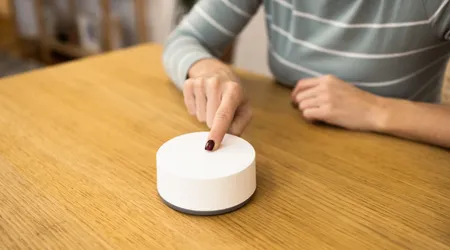Smart Home Hubs: Choosing the Right System

The rise of smart home hubs has revolutionized how we interact with our living spaces.
These central control units are the brains behind your connected devices, from smart lights to security cameras, offering convenience, efficiency, and peace of mind.
But with so many options on the market, how do you choose the right system for your needs?
This guide dives deep into the world of smart home hubs, exploring key features, compatibility, and future trends to help you make an informed decision.
Why Smart Home Hubs Matter in 2024
As the Internet of Things (IoT) continues to expand, the demand for seamless integration between devices has never been higher.
According to a 2023 report by Statista, the global smart home market is projected to reach $222 billion by 2027, with smart home hubs playing a pivotal role in this growth.
These devices act as the glue that binds your ecosystem together, ensuring that your smart thermostat, voice assistants, and door locks work in harmony.
But not all hubs are created equal.
Some prioritize voice control, while others excel in security or energy management.
Understanding your priorities is the first step in selecting the right system.
Additionally, as technology advances, the capabilities of smart home hubs are expanding.
Features such as remote access and integration with home security systems are becoming standard.
This evolution allows homeowners to manage their properties more efficiently and securely from anywhere in the world.
+ Connected Kitchen: Smart Appliances Worth Investing In
Key Features to Look for in a Smart Home Hub
When evaluating smart home hubs, consider the following features to ensure you’re investing in a system that meets your needs:
- Compatibility: The best hubs support a wide range of protocols, such as Zigbee, Z-Wave, and Wi-Fi.
This ensures they can communicate with devices from different brands.
- Voice Control Integration: If you rely on Alexa, Google Assistant, or Siri, choose a hub that seamlessly integrates with your preferred voice assistant.
- Security: With cyberattacks on the rise, opt for a hub with robust encryption and regular firmware updates.
- Scalability: Your smart home will likely grow over time.
A good hub should accommodate additional devices without compromising performance.
- User Interface: A user-friendly app or dashboard makes it easier to manage your devices and create automation routines.
Moreover, consider the hub’s ability to support automation routines and schedules.
This feature allows you to set specific times for devices to turn on or off, enhancing convenience and energy efficiency.
Additionally, look for hubs that offer compatibility with third-party services, which can expand your smart home’s capabilities even further.
Comparing Popular Smart Home Hubs
To help you narrow down your options, here’s a comparison of three leading smart home hubs:
| Hub | Compatibility | Voice Control | Security Features | Price |
|---|---|---|---|---|
| Amazon Echo (4th Gen) | Zigbee, Wi-Fi | Alexa | Basic encryption | $99.99 |
| Samsung SmartThings | Zigbee, Z-Wave, Wi-Fi | Alexa, Google Assistant | Advanced encryption | $129.99 |
| Apple HomePod Mini | Thread, Wi-Fi | Siri | End-to-end encryption | $99.00 |
As you can see, each hub has its strengths.
The Amazon Echo is a budget-friendly option with solid Alexa integration, while Samsung SmartThings offers broader compatibility.
The Apple HomePod Mini, on the other hand, is ideal for users deeply embedded in the Apple ecosystem.
Additionally, consider the long-term support and updates provided by the manufacturers.
Regular software updates can enhance the functionality and security of your hub over time.
Researching user experiences and community feedback can also provide insights into the reliability and performance of each hub.
The Role of Automation in Smart Home Hubs
One of the most compelling reasons to invest in a smart home hub is automation.
Imagine waking up to your blinds opening, your coffee brewing, and your thermostat adjusting to the perfect temperature—all without lifting a finger.
Automation not only enhances convenience but also improves energy efficiency.
For instance, a study by the American Council for an Energy-Efficient Economy (ACEEE) found that smart thermostats can reduce heating and cooling costs by up to 10-15%.
Pairing a smart thermostat with a hub that supports automation routines can amplify these savings.
Furthermore, automation can extend beyond simple scheduling.
Advanced systems allow for geofencing, where devices respond based on your location.
For example, your lights can automatically turn on when you arrive home, creating a welcoming environment without any effort on your part.

Future Trends in Smart Home Technology
The world of smart home hubs is constantly evolving.
Here are two trends to watch in 2024 and beyond:
- Matter Protocol: This new universal standard aims to unify smart home devices, making it easier for them to work together regardless of brand.
Hubs that support Matter will future-proof your investment.
- AI-Powered Hubs: Artificial intelligence is making its way into smart home hubs, enabling more intuitive automation and predictive analytics.
For example, an AI-powered hub might learn your daily routine and adjust your devices accordingly.
Additionally, the integration of machine learning can enhance security features.
Hubs may become capable of recognizing unusual patterns in device usage, alerting homeowners to potential security threats.
This proactive approach to home security can provide peace of mind, knowing that your home is being monitored intelligently.
How to Choose the Right Hub for Your Lifestyle
Selecting the perfect smart home hub depends on your unique needs and preferences.
Here’s a quick guide to help you decide:
- Tech Enthusiasts: If you love experimenting with the latest gadgets, opt for a hub with broad compatibility and advanced features like Samsung SmartThings.
- Apple Users: The Apple HomePod Mini is a no-brainer for those who already own iPhones, iPads, or Macs.
- Budget-Conscious Buyers: The Amazon Echo offers excellent value for money without sacrificing essential features.
Moreover, consider your long-term plans for your smart home.
If you anticipate expanding your connected devices significantly, investing in a more versatile hub now may save you from upgrading in the near future.
Assessing your lifestyle and how you use technology daily can also guide your choice, ensuring you select a hub that complements your routine.
++ Smart Lighting Systems: Complete Installation Guide
Common Pitfalls to Avoid
While smart home hubs offer numerous benefits, there are a few pitfalls to watch out for:
- Overcomplicating Your Setup: Start with a few devices and gradually expand.
Adding too many devices at once can lead to compatibility issues.
- Ignoring Security: Always choose a hub with strong security features and keep its firmware updated.
- Neglecting User Reviews: Real-world experiences can provide valuable insights into a hub’s performance and reliability.
Additionally, avoid locking yourself into a single ecosystem unless you are certain it meets all your needs.
Choosing a hub that offers flexibility and compatibility with various brands can prevent frustration down the line.
Lastly, be cautious of promotional deals that seem too good to be true; they may come with hidden limitations or lack essential features.

Final Thoughts
Choosing the right smart home hub is a critical step in building a connected home that works for you.
By considering factors like compatibility, automation capabilities, and future trends, you can find a system that aligns with your lifestyle and budget.
Whether you’re a tech enthusiast or a casual user, the right hub can transform your living space into a seamless, efficient, and secure environment.
As the smart home industry continues to evolve, staying informed about the latest developments will ensure your setup remains cutting-edge.
So, take your time, do your research, and invest in a smart home hub that truly enhances your daily life.
In conclusion, the journey to a smarter home is both exciting and rewarding.
With the right tools and knowledge, you can create a connected environment that simplifies your life and increases your home’s value.
